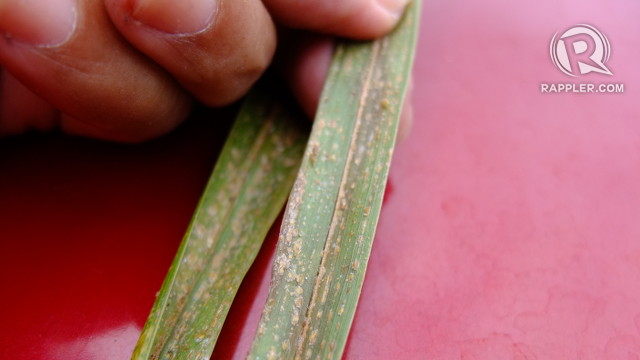SUMMARY
This is AI generated summarization, which may have errors. For context, always refer to the full article.
MANILA, Philippines (UPDATED) – The pest that has laid waste to more than a million coconut trees in Calabarzon now threatens to infest trees in Mimaropa (Region 4-B), Bicol (Region 5) and the Zamboanga Peninsula (Region 9).
Presidential Assistant for Food Security and Agricultural Modernization Francis Pangilinan explained on Monday, June 9, that the coconut scale insect can cover great distances because it is airborne, allowing it to jump even from one island province to another.
“The infestation has already been reported in Tagkawayan, Quezon. This is the last town before Camarines Norte. This means without effective intervention, even the Bicol region will be affected,” he said to reporters in Filipino.
As of June, some 1.2 million trees have been infested in Batangas, Laguna, Cavite, Quezon (Luzon) and in Basilan (in Mindanao). The highest concentration is in Batangas, with over 500,000 infected trees, reported Pangilinan.
The formidable pest, never before seen in the Philippines, is known scientifically as Aspiodotus rigidus, a species of coconut scale insect.
Appearing as tiny, yellowish-brownish spores, they smother coconut tree leaves, stopping photosynthesis.
Infested trees have dry, drooping, brown leaves, and nuts with sour water. Eventually, the entire tree withers away. At any given time, one infested tree may be hosting 4 million of these insects.
6-month plan
Malacañang on June 5 issued Executive Order 169, detailing emergency measures to control, manage and eradicate the pest outbreak.
All affected areas will be put on quarantine as a massive spraying, pruning, cutting and burning campaign is waged, targeting infested trees. Measures will also be undertaken in the 3 threatened regions.
The Scale Insect Emergency Action Program will last for 6 months starting June, said Pangilinan.
The general steps the program will take are the following:
- pruning and burning of drying coconut tree leaves, an indication of infestation
- injection of green label systemic pesticides into the tree trunks
- spraying using organic pesticide
- release of bio-control agents or friendly insects that can kill the pest
- fertilization and strengthening of trees to enable them to recover faster
The Department of Budget and Management has made available P400 million in PCA funds to finance the first 3 months of the emergency program.
Cash-for-work program
Coconut farmers who have lost their source of income with the infestation of their trees will receive assistance from the government in the form of a cash-for-work program.
Farmers who help in the spraying, cutting, pruning, and burning of infested trees can earn P200 to P300 a day, said Pangilinan.
“Our priority is to give jobs to the farmers who have no more income because their coconut trees are gone,” he stressed.
There are around 3.5 million coconut farmers in the country. The Philippine coconut industry contributes P87.3 billion ($2 billion) to the economy and accounts for 60% of the world’s total coconut exports.
Meanwhile, coconut farmers are considered among the poorest farmers in the country, earning only around P15,000 every year.
The pest was first reported to the Philippine Coconut Authority in 2010 after it was observed in Tanauan, Batangas. Because it is not an endemic species, there were no natural predators to kill it or keep it at bay, said the PCA.
Though how the pest entered the Philippines remains a mystery, Pangilinan said it may have been hosted by ornamental plants brought in through Batangas ports. – Rappler.com
Add a comment
How does this make you feel?

There are no comments yet. Add your comment to start the conversation.